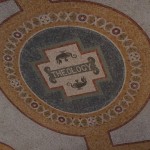We run our website the way we wished the whole internet worked: we provide high quality original content with no ads. We are funded solely by your direct support. Please consider supporting this project.

Knowing the Eternal God
If all our knowledge about God is to be oriented around the cross, as I argue in many places (see this post for instance), what does this mean for how we reflect on God’s transcendence? In other words, how can we speak of God’s eternal being since there obviously was no cross within God prior to, and apart from, the fallen world?
To begin, let me say that I cannot throw my hat in the ring with that radically temporalistic strand of contemporary theology that virtually does away with any distinction between God’s eternal being and his revelation in Christ. In technical terms, they eliminate the distinction between ad intra (his eternal being) and ad extra (his revelation). Hence, for example, Eberhard Jüngel and Jürgen Moltmann define God as “the event” in which he reveals himself in Jesus Christ.
By contrast, I affirm the ad intra/ad extra distinction. But I also fully embrace Karl Rahner’s teaching that, if the way God is toward us in Christ truly reveals God, then there must be, at the very least, a strong analogical correspondence between God’s immanent eternal being and his economic revelation in Christ. But this correspondence allows me to affirm contingent aspects of his revelation toward us —aspects such as his becoming-human and his becoming-sin—that we must consider to be absent in the way God exists within his threefold self prior to and apart from creation.
While a great deal could be said about this matter, the point I want to make about his eternal being ad intra concerns the character of his threefold identity. That is, while there is obviously no Incarnation or Crucifixion within the immanent Trinity prior to creation, we must affirm that the infinitely intense love of God that is expressed when God stooped an infinite distance to become our sin and our curse on Calvary expresses the unsurpassable intensity of the unwavering perfect love that the three divine Persons have for each other throughout eternity.
Moreover, inasmuch as the Church as the bride of Christ is a contingent expression of the Father’s perfect love for the Son that is mediated by the Spirit, and inasmuch as the bride, abiding in the Son, shares in the Son’s reception of the Father’s perfect love and participates in the Son’s perfect love for the Father mediated through the Spirit, we must go further and add that God’s revelation to us expresses, and even participates in, the perfect eternal love that unites the triune fellowship throughout eternity.
The best expression in Church history of the infinitely intense triune love that is revealed on the cross and that characterizes God ad intra, in my estimation, is found in the concept of the perichoresis of the three Persons. In essence, this concept stipulates that the other-oriented love of the three divine Persons is such that throughout eternity they have completely given themselves over to one another and thus fully dwell within one another. This is the infinitely intense, triune, mutually-indwelling love that is incarnated and revealed in Christ and that the Church is graciously made a participant of.
Photo credit: kafoster27 via Visualhunt / CC BY-ND
Category: General
Tags: Cross, God's Character, Perichoresis, Trinity
Related Reading

Are You Fully Alive? Here’s the Key
Image by rashdada via flickr. The cross reveals the full truth about us. This truth reconnects us with our true source of life, which in turn heals our idol addictions. This dimension of the cross is frankly so breathtakingly beautiful that, so far as I can tell, very few followers of Jesus have ever really grasped it.…

Jesus and His Father
Greg addresses a question from a reader about the nature of the Godhead. If Jesus is the exact representation of the Father, what does this mean about the Trinity, if there are indeed three distinct persons?

Why God Made You
The life God has for each one of us is a life of perfect love, one that eternally unites us with the Father, Son and Holy Spirit. This is why God made us. It’s what we long for, to love and be loved. However, things like the love of the Trinity are not part of…

Re-Thinking Divine Sovereignty
Many people in the church have been taught that divine sovereignty is synonymous with unilateral control. Some have even argued that if God is not in control of everything, then something must be in control of him. Still others have proposed that if God is not sovereign over all, then he has no sovereignty at…

The Ultimate Criteria for Theology
Theology is thinking (logos) about God (theos). It is a good and necessary discipline, but only so long as it is centered on Christ. All of our speculation and debate about such things as God’s character, power, and glory must be done with our focus on Jesus Christ—more specifically, on the decisive act by which…

The Greatest Mystery of the Christian Faith
God has always been willing to stoop to accommodate the fallen state of his covenant people in order to remain in a transforming relationship with them and in order to continue to further his sovereign purposes through them. Out of love for humankind, Scripture tells us, Jesus emptied himself of his divine prerogatives, set aside…
